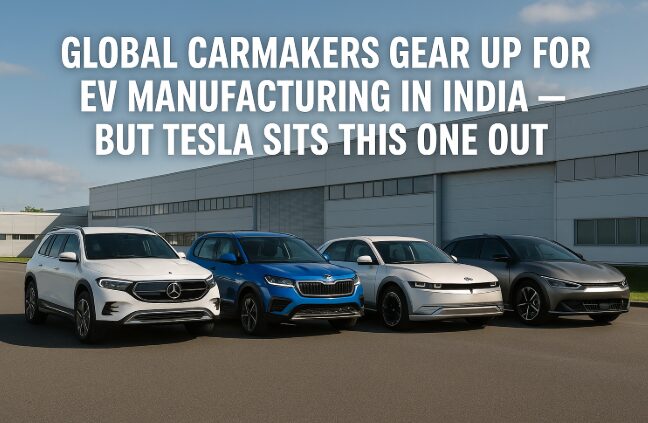Quick Take:
- Big players like Mercedes-Benz, Skoda-Volkswagen, Hyundai, and Kia are all set to start EV production in India.
- On the flip side, Tesla isn’t interested in local manufacturing, at least for now—showrooms are their current focus.
- New government scheme offers reduced import duties and demands a ₹4,150 crore investment.
- India inches closer to becoming a global electric mobility manufacturing hub.
A Big Leap for India’s EV Ambitions
India’s electric vehicle (EV) revolution just got a serious boost. Some of the world’s biggest carmakers—Mercedes-Benz, Hyundai, Kia, and Volkswagen-Skoda—have officially shown interest in manufacturing EVs in India. This came straight from Union Heavy Industries Minister H D Kumaraswamy, who confirmed their intent during a press briefing earlier this week.
But not everyone’s ready to plug in. Tesla, surprisingly, has backed out of the manufacturing conversation. Their focus, for now, seems to be limited to launching showrooms in India rather than building cars here.
Yes, you read that right. While India rolls out the red carpet for EV makers, Elon Musk’s Tesla is choosing to watch from the sidelines.
So, What’s This Scheme All About?
The Indian government recently launched the “Scheme to Promote Manufacturing of Electric Passenger Cars in India, and it’s more than just a policy—it’s an open invitation for global brands to make in India. The idea is simple: reward companies that commit to building EVs locally and investing in India’s electric future.
Here’s what the scheme offers:
| What’s in the Scheme? | Details |
|---|---|
| Reduced Import Duty | EVs with a minimum CIF value of $35,000 get 15% duty (vs. 100%) |
| Mandatory Investment | At least ₹4,150 crore in local manufacturing |
| Application Window | 120 days (can reopen until March 15, 2026) |
| Objective | Create EV manufacturing infrastructure and local job opportunities |
Who’s In – And Who’s Not?
In the Game:
- Mercedes-Benz wants to scale up their EV presence and sees India as a key part of that vision.
- Volkswagen and Skoda are excited about tapping into India’s fast-growing EV ecosystem.
- Hyundai and Kia already have strong foundations here, and are now ready to go fully electric with local production.
Tesla’s Unplugged Plan:
While the world expected Tesla to be a part of this big move, the reality is different. According to Minister Kumaraswamy, Tesla was involved in the first round of stakeholder meetings, but never returned for further discussions.
“Tesla… they are more interested in only starting showrooms. They are not interested in manufacturing in India,” said Kumaraswamy.
It’s a clear sign that Tesla is still testing the waters, rather than diving in.
Why This Is a Big Deal for India?
India has long been seen as an untapped EV goldmine, and this scheme might just be the tipping point. Here’s what makes it so crucial:
1. Big Brands = Big Boost
When global names like Mercedes and VW bet on India, it builds trust and sets the tone for others to follow.
2. More Affordable EVs
With local manufacturing, luxury EVs could become much more affordable for Indian consumers.
3. Job Creation & Supply Chain Growth
Setting up factories means thousands of jobs, plus a ripple effect across the supply chain—from battery manufacturing to software development.
4. India Becomes an EV Export Hub
If done right, India won’t just be a market—it could be a global EV export base, thanks to cost advantages and skilled labor.
Final Thoughts: The Race Has Begun
India’s EV journey is gaining serious momentum. With brands like Hyundai, Kia, VW, and Mercedes gearing up to build EVs here, the country is quickly positioning itself as a manufacturing powerhouse.
Tesla, meanwhile, is taking the slower road, likely waiting for infrastructure, demand, and policy clarity to mature before committing. It’s a strategic move—but one that may cost them first-mover advantage.
For now, the real action belongs to the automakers willing to invest, build, and believe in India’s electric future.

